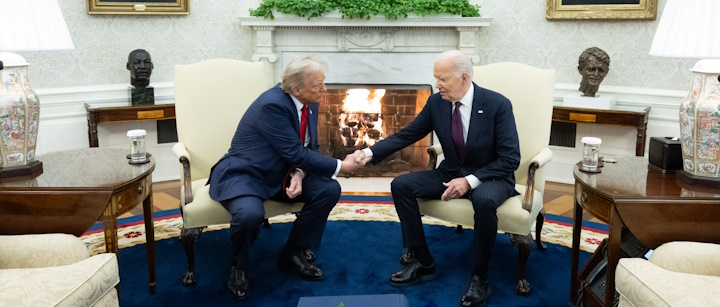





President Joe Biden's presidency has been characterized by significant economic achievements, including the addition of 16.6 million jobs from February 2021 to December 2024, and a drop in the unemployment rate to 3.4% in January 2023, the lowest in nearly 54 years [98113d1d]. However, these accomplishments are overshadowed by rising inflation, which has increased by 20.5% since February 2021, with grocery prices soaring by 22.6% [98113d1d].
Biden's administration enacted over $4 trillion in economic relief and infrastructure investments, which contributed to a robust job market and a 63.77% gain in the S&P 500 from January 20, 2021, to January 16, 2025 [98113d1d]. Despite these positive indicators, the national debt has reached $36 trillion, raising concerns about the sustainability of future economic growth [98113d1d].
In a recent analysis, Matt Winkler, co-founder and former Editor-in-Chief of Bloomberg News, praised Biden as the best U.S. president since Jimmy Carter, citing his ranking in eight out of fifteen economic categories, including manufacturing jobs and budget deficit to GDP ratio [8e4dcc7d]. Under Biden, the U.S. has seen the largest increase in manufacturing jobs in 50 years and a significant decline in inflation from 9.1% in June 2022 to 2.9% in December 2024 [8e4dcc7d].
The housing market has also faced challenges, with housing costs increasing by 18% since the first quarter of 2021, leading to a median home price of $420,400 [98113d1d]. In response to inflation, the Federal Reserve has raised interest rates, with 30-year mortgage rates peaking at 7.04% [98113d1d].
As Biden prepares to exit office, his economic policies have led to a mixed legacy. While the job market shows resilience and wage gains have been historic, the persistent inflation and rising costs of living have left many Americans feeling economically strained [9e480c76].
Former White House officials have expressed regret over the scale of the American Rescue Plan Act (ARPA), suggesting that the administration's economic initiatives may not have resonated with voters as intended [df85503f]. Biden's approval rating stands at 36%, with only 33% approving of his handling of the economy, indicating a significant disconnect between economic indicators and public perception [9e480c76].
As President-elect Donald Trump prepares to take office, he will inherit a resilient economy characterized by 2.5% annual growth since early 2021 and an unemployment rate of 4.1%, which is below the historical norm [aa80e179]. Trump will also face challenges such as 36.8 million people living in poverty, representing 11.1% of the population, and a significant number of individuals enrolled in the Affordable Care Act [aa80e179].
Biden has warned of the growing concentration of wealth in the U.S., which he believes poses a threat to democracy, emphasizing the need for policies that address these disparities [e475980d]. As both parties navigate the complexities of the current economic landscape, the future of U.S. industrial policy remains uncertain, with significant implications for the nation's economic direction [0ca80e91].